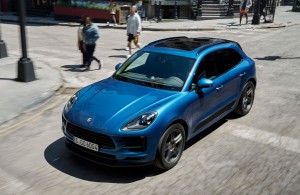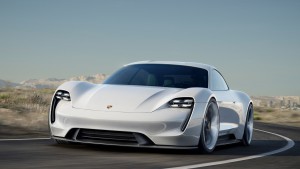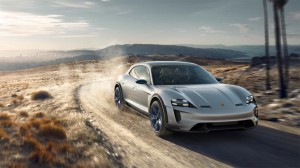Even as it prepares to launch its first all-electric offering, Porsche has announced plans for a third battery-car model, this one to come in the form of the next-generation Macan, the compact SUV that is its best-selling product line.
The German automaker isn’t providing any details about the electric Macan, but it is likely to become the first of its products to use the PPE platform being developed as part of a collaboration with Audi, another upscale member of the Volkswagen family.
“Electromobility and Porsche go together perfectly; not just because they share a high-efficiency approach, but especially because of their sporty character,” Porsche CEO Oliver Blume said in a statement.
The VW Group has so far committed to the industry’s broadest electrification strategy, with more than 50 battery-electric vehicles, or BEVs, set to be distributed through its dozen passenger car brands by 2025. These will range from mainstream offerings sold by the Volkswagen, Seat and Skoda brands, as well as high-line models produced by Bentley, Audi and Porsche.
(Plugging in: An inside look at the MEB – VW’s platform for an electric future. Click Here for the story.)
“By 2022 we will be investing more than 6 billion euros in electric mobility, and by 2025 50% of all new Porsche vehicles could have an electric drive system,” added Blume.
Porsche’s first BEV is the Taycan – which is based on the Mission E concept. It will reach market late this year. And it will be followed in 2020 by a crossover version dubbed the Cross Turismo.
Both of those battery vehicles will be based on a unique platform developed specifically for Porsche. Going forward, parent VW wants to communize the underlying architectures used for its electric vehicles to improve economies of scale. Most of its future BEVs will be based on a platform called the MEB. High-line models, however, will use an architecture dubbed the PPE. That architecture is planned for production in 2022, which coincides with the anticipated timing of the next-gen Macan.
The PPE platform will be more expensive than the MEB but will add features, such as torque vectoring, designed to appeal to high-line and performance drivers.
(Click Here for more about the new Porsche Macan.)
Like Tesla, Porsche’s battery vehicles also will take advantage of the instantaneous torque offered by electric motors, the Taycan expected to launch from 0 to 60 in less than 4 seconds. The all-electric Macan is expected to offer similar levels of performance.
Porsche’s news release did note that the new SUV will feature an 800-volt drive system which should also enhance its charging capabilities. The VW Group, as a whole, has been actively promoting the development of charging infrastructures in both Europe and North America, while emphasizing ultra-fast versions of Level 3 technology. Where chargers capable of delivering at least 350 kilowatts of current are available, the Taycan will be capable of extending range by nearly 20 miles a minute. That would come reasonably close to matching the time it takes to fill up a gas vehicle’s tank.
The next-generation Macan will be produced at Porsche’s plant in Leipzig, the company investing more than 1.3 million euros at the facility in recent years. Production of the Macan began there in 2011. The Leipzig plant will also produce the Taycan and Cross Turismo.
(Porsche may add battery-electric Macan next, hints CFO. Click Here for the story.)
“Over the next 10 years we will focus on a drive mix consisting of even further optimized (gas) engines, plug-in hybrid models, and purely electrically operated sports cars,” said Blume. “Our aim is to take a pioneering role in technology.”



